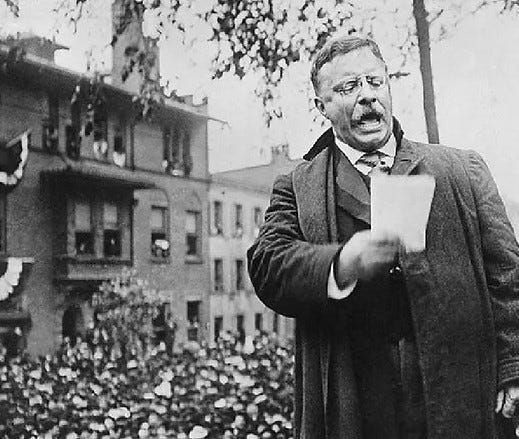Resilience in Presidental History
The last time there was an assasination attempt of a former president was 1912
"What lies behind us and what lies before us are tiny matters compared to what lies within us."
– Ralph Waldo Emerson
Resilience in our Presidental History
Chasing Influence: Transformational Coaching to Build Champions for Life
Former President Trump was the target of a horrific assassination attempt on Saturday, July 13th. As we seek answers in the coming weeks, we look to the past to understand the future. The last time a former* president faced such a threat was in 1912 when Theodore Roosevelt, the 26th President of the United States, was shot while campaigning for his hopeful return to the White House.
Roosevelt, known for his boundless energy and larger-than-life personality, was a trailblazer. He was the first president to fly in an airplane, own a car, have a telephone in his home, travel outside the U.S. while in office, and host a black guest, Booker T. Washington, for dinner at the White House. He encapsulated his approach to life in his famous "man in the arena" speech delivered in Paris, France, on April 23, 1910.
The impact of Roosevelt's words has transcended generations, but his grit and determination were never more evident than on October 14, 1912. As he stood in his open vehicle outside the Gilpatrick Hotel in Milwaukee, a flash from a Colt revolver fired by a would-be assassin, John Schrank, struck Roosevelt in the chest. The bullet traveled through an eyeglasses case and the written speech in his jacket pocket before lodging in his chest. Remarkably, it did not stop him. The assailant was quickly subdued, and the crowd turned into a furious mob, shouting, "Kill him!" Roosevelt, maintaining his composure, demanded, "Don’t hurt him. Bring him here. I want to see him.” He asked Schrank, "What did you do it for?" before calmly turning him over to the police.
Undeterred by the attack, Roosevelt assessed his condition. He coughed into his hand to check for blood. Seeing none, he reasoned the bullet had not entered his lungs. Despite pleas to go to the hospital, Roosevelt insisted on delivering his speech. At the Milwaukee Auditorium, he revealed his bloodstained shirt and the bullet-riddled, 50-page speech to the shocked audience. "It takes more than that to kill a bull moose," he declared, holding up the speech with two large holes through each page. The thick speech and his eyeglass case had likely saved his life by slowing the bullet. Deemed too dangerous to remove, the bullet remained in Roosevelt’s chest for the rest of his life.
For the next 86 minutes, Roosevelt spoke with his customary passion, despite a weakening voice and shortness of breath. Only after completing his address did he finally agree to visit the hospital.
Strength, courage, and calls for unity and calm resonate through history. Over a hundred years later, we find ourselves echoing these same prayers today.
“It is not the critic who counts; not the man who points out how the strong man stumbles, or where the doer of deeds could have done them better. The credit belongs to the man who is actually in the arena, whose face is marred by dust and sweat and blood; who strives valiantly; who errs, who comes short again and again, because there is no effort without error and shortcoming; but who does actually strive to do the deeds; who knows great enthusiasms, the great devotions; who spends himself in a worthy cause; who at the best knows in the end the triumph of high achievement, and who at the worst, if he fails, at least fails while daring greatly, so that his place shall never be with those cold and timid souls who neither know victory nor defeat.”
– Theodore Roosevelt
*Assassination/attempts have occurred on sitting presidents more recently.
If you enjoyed this story, a series of three Chasing Influence workbooks is available. Stories are accompanied by discussion questions and answers. Each workbook contains 33 lessons to use with any team.
Updates on Chasing Influence
Chasing Influence: Transformational Coaching to Build Champions for Life is available in Kindle, softcover, hardcover, and audiobook editions.
For additional resources, links to podcast appearances, and other Chasing Influence news, click here.
©Troy Urdahl, 2024


